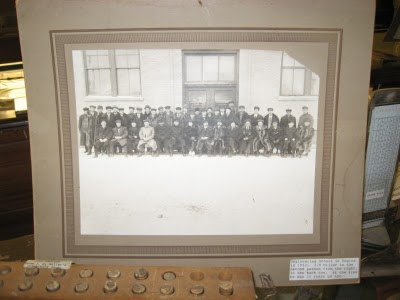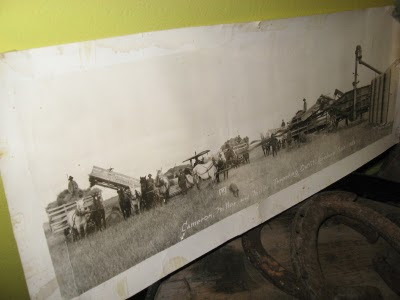The syllabus for my BLST415 / BT829
Prophecy after the Prophets course is officially due
a month from Monday, so
this draft list is probably pretty close to final, but there is still time to make changes. Does the reading seem too heavy? Are there other, better readings that I should include? What am I missing? I welcome any and all feedback:
Part I: Biblical Prophecy and its Aftermath
Introduction // Old Testament Prophecy: An Overview (14 Jan)
Secondary Reading (27 pages): Petersen, David L. “Prophet, Prophecy.” Pages 622-648 in The New Interpreter’s Dictionary of the Bible. Vol. 4. Katharine Doob Sakenfeld, ed. Nashville: Abingdon, 2009.
Primary Reading: 1 Kings 17-2 Kings 10; Jeremiah 1-4; Ezek 1-3; Amos
What Happened to Biblical Prophecy? Part I (21 Jan)
Secondary Reading (23 pages):
Wellhausen, Julius. “Chapter X: The Oral and the Written Torah.” Pages 392-410 in
Prolegomena to the History of Ancient Israel. Edinburgh: A&C Black, 1885. Repr. New York: Meridian, 1957. Online:
http://www.sacred-texts.com/bib/cv/phai/index.htm.
Cross, Frank Moore. “A Note on the Study of Apocalyptic Origins.” Pages 343-6 in Canaanite Myth and Hebrew Epic: Essays in the History of the Religion of Israel. Cambridge: Harvard University Press, 1973.
Primary Reading: Isaiah 24-27; Daniel 7-12; Zechariah; 1 Enoch 1-16
What Happened to Biblical Prophecy? Part II (28 Jan)
Secondary Reading (58 pages):
Greenspahn, Frederick E. “Why Prophecy Ceased.” Journal of Biblical Literature 108.1 (1989): 37-49.
Sommer, Benjamin D. “Did Prophecy Cease? Evaluating a Reevaluation.” Journal of Biblical Literature 115.1 (1996): 31-47.
Grabbe, Lester L. “Thus Spake the Prophet Josephus . . . : The Jewish Historian on Prophets and Prophecy.” Pages 240-7 in Prophets, Prophecy, and Prophetic Texts in Second Temple Judaism. Michael H. Floyd and Robert D. Haak, eds. Library of Hebrew Bible/Old Testament Studies 427. New York: T&T Clark, 2006.
Miller, David M. “Josephus and the προφηταί: Exploring the Non-Use of a Label.” Paper presented at the annual meeting of the Canadian Society of Biblical Studies, Vancouver, BC, 3 June 2008.
Part II: Perceptions of Prophecy and Inspired Experience in Early Judaism
Perspectives on the Past and the Present (4 Feb)
Secondary Reading (52 pages):
Barton, John. Pages 96-140 (Chapter 3 “Prophets and their Message”) and 266-273 (Conclusion) in Oracles of God: Perceptions of Ancient Prophecy in Israel after the Exile. Repr. New York: Oxford University Press, 1988.
Brooke, George J. “Prophecy.” Pages 694-700 in Encyclopedia of the Dead Sea Scrolls. L. Schiffman and J. VanderKam, eds. Vol. 2. Leiden: Brill, 2000.
Primary Reading: Excerpts from Josephus, Philo and Ben Sira
Reading the “Prophets” (11 Feb)
Secondary Reading (66 pages):
Barton, John. “Chapter 4: Modes of Reading the Prophets.” Pages 141-153 in Oracles of God: Perceptions of Ancient Prophecy in Israel after the Exile. Repr. New York: Oxford University Press, 1988.
Wendel, Susan. “Chapter One: Early Jewish Exegetes and Community Identity.” Pages 27-79 in “To Hear and Perceive: Scriptural Interpretation and Community Self-Definition in Luke-Acts and the Writings of Justin Martyr.” Ph.D., McMaster University, 2009.
Primary Reading: Habakkuk; 1QpHab
Eschatological Prophets (18 Feb)
Secondary Reading (77 pages):
Allison, Dale C. Pages 73-84 in The New Moses: A Matthean Typology. Minneapolis: Fortress, 1993.
Faierstein, Morris M. “Why Do the Scribes Say That Elijah Must Come First.” Journal of Biblical Literature 100 (1981): 75-86.
Allison, Dale C. “Elijah Must Come First.” Journal of Biblical Literature 103 (1984): 256-258.
Fitzmyer, Joseph A. “More about Elijah Coming First.” Journal of Biblical Literature 104 (1985): 295-296.
Barnett, P. W. “The Jewish sign prophets--A.D. 40-70--their intentions and origin.” New Testament Studies 27 (1981): 679-697.
Horsley, Richard A. “‘Like One of the Prophets of Old’ : Two Types of Popular Prophets at the Time of Jesus.” Catholic Biblical Quarterly 47 (1985): 435-463.
Primary Reading: Deut 13, 18, 34; Malachi 3-4; DSS and Josephus excerpts
Part III: Prophecy and Early Christianity
Prophecy and the Historical Jesus (25 Feb)
Secondary Reading: (59 pages)
Jeremias, Joachim. “The Return of the Quenched Spirit.” Pages 76-85 in New Testament Theology: Part One: The Proclamation of Jesus. London: SCM Press, 1971.
Wright, N.T. “Chapter 6: The Praxis of a Prophet.” Pages 147-195 in Jesus and the Victory of God. Minneapolis: Fortress, 1996.
Primary Reading: Luke 1-2
Prophecy and Luke-Acts Part I: Christology (4 Mar)
Secondary Reading: (48 pages)
Robinson, John A. T. “Elijah, John and Jesus: An Essay in Detection.” New Testament Studies 4 (1958): 263-281.
Croatto, J. Severino. “Jesus, Prophet Like Elijah, and Prophet-Teacher like Moses in Luke-Acts.” Journal of Biblical Literature 124.3 (2005): 451-465.
Kingsbury, Jack Dean. “Jesus as the ‘Prophetic Messiah’ in Luke’s Gospel.” Page 29-42 in The Future of Christology: Essays in Honor of Leander E. Keck. A. J. Malherbe and W. A. Meeks, eds. Philadelphia: Fortress, 1993.
Primary Reading: Luke 1-4; 7; 9; 13:22-35; 16:16; 20:6; 22:63-71; 24; Acts 3:11-26; 7
Prophecy and Luke-Acts Part II: Christian Prophecy // Research Workshop (18 Mar)
Secondary Reading: (67 pages)
Aune, David E. “Chapter 8: The Character of Early Christian Prophecy.” Pages 189-231 in Prophecy in Early Christianity and the Ancient Mediterranean World. Grand Rapids: Eerdmans, 1991.
Ellis, E. Earle. “The Role of the Christian Prophet in Acts.” Page 55-67 in
Apostolic History and the Gospel: Biblical and Historical Essays Presented to F. F. Bruce on his 60th Birthday. W. Ward Gasque and Ralph P. Martin, eds. Grand Rapids: Eerdmans, 1970. Online:
http://www.biblicalstudies.org.uk/pdf/prophet_ellis.pdfStronstad, Roger. “The Prophethood of All Believers: A Synthesis.” Pages 114-124 in The Prophethood of All Believers: A Study in Luke’s Charismatic Theology. Journal of Pentecostal Studies Supplement. Sheffield: Sheffield Academic Press, 1999.
Primary Reading: Acts 2:1-47; 11:27-30; 13:1-12; 15:1-41; 19:1-21; 21:1-16
Prophecy and Luke-Acts Part III & Prophecy in the Greco-Roman World (25 Mar)
Secondary Reading: (74 pages)
Moessner, David P. “‘The Christ Must Suffer’: New Light on the Jesus - Peter, Stephen, Paul Parallels in Luke-Acts.” Novum Testamentum 28.3 (1986): 220-256. (ATLAS)
Forbes, Christopher. “Chapter 11: Prophecy and Oracles in the Hellenistic World.” Pages 279-315 in Prophecy and Inspired Speech in Early Christianity and Its Hellenistic Environment. WUNT 2/75. Tübingen: J.C.B. Mohr (Paul Siebeck), 1995. Repr. Peabody, MA: Hendrickson, 1997.
Primary Reading: To be determined.
Paul and Prophecy Part I (1 Apr)
Secondary Reading: (52 pages)
Grudem, Wayne A. “Appendix 5: Why Christians Can Still Prophesy.” Pages 313-328 in The Gift of Prophecy in the New Testament and Today. Rev. ed. Westchester, IL: Crossway Books, 2000.
Gillespie, Thomas W. “Chapter 4: Prophecy and Tongues (1 Corinthians 14:1-40).” Pages 129-164. The First Theologians: A Study in Early Christian Prophecy. Grand Rapids: Eerdmans, 1994.
Primary Reading: 1 Cor 11-14; 1 Thess 5
Paul and Prophecy Part II (8 Apr)
Secondary Reading: (55 pages)
Turner, Max. “Chapter 12: Prophecy in the New Testament.” Pages 185-220 in The Holy Spirit and Spiritual Gifts in the New Testament Church and Today. Rev. ed. Peabody MA: Hendrickson Publishers, 1998
Moberly, R. W. L. “Chapter 7: Prophecy and Discernment Today?” Pages 221-239 in Prophecy and Discernment. Cambridge studies in Christian doctrine 14. Cambridge, UK: Cambridge University Press, 2006.
Primary Reading: 1 Cor 11-14; 1 Thess 5
Revelation and Beyond (12 Apr)
Primary Reading:
Didache 9-16; Hermas,
Mandate 11; Justin
Dialogue 82.1-2; Tertullian,
On the Soul 9.4; Eusebius,
Ecclesiatical History 5.14-19



















